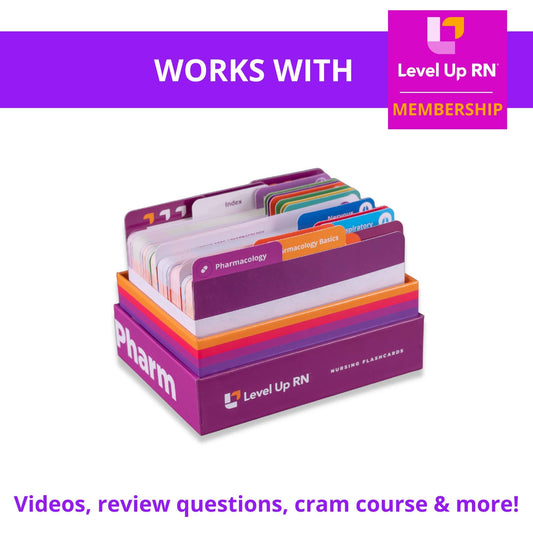The Pharmacology Cards for Nursing Students that we created will allow you to focus on the most important aspects of the medications you need to know for your Pharmacology exam. In addition to the content provided in the flashcards, we have included some of Cathy's PRO tips for studying pharmacology below.
Check out our interactive Pharmacology Study Guide.
Pharmacology - Nursing Flashcards
Regular price
$49.95
Regular price
$49.95
Sale price
$49.95
Unit price
per
How to Study Pharmacology

Study Smarter
- Memorize the GENERIC name of the medication. The generic drug name will always be provided, but the brand name is often not provided.
- These cards are most effectively used in conjunction with watching our Pharmacology video series.
- Feel free to write down tips or other notes on the back of the cards. We designed the back of the cards to be matte for just that purpose!
- We recommend taking 20-30 cards with you on a walk, multiple times a week. Getting exercise will help you think more clearly (and feel better physically). Also, studying and walking at the same time (if you can) is a more efficient use of your time.
- Research shows that studying for 1-2 hours multiple times a week is BETTER than studying for many hours on one day. You will retain much more information.

Short Cuts & Hacks
- When in doubt regarding a food interaction, go with grapefruit juice!
- When asked about a common side effect, go with something like GI upset or headache. Not something serious like urinary retention or seizures.
- Know your anticholinergic side effects. Cathy's PG-13 tip: Can’t see, can’t pee, can’t spit, can’t s**t. The most serious anticholinergic side effect is typically urinary retention.
- Know how to counteract anticholinergic medication side effects: chew sugarless gum, wear sunglasses, consume a high fiber diet, and increase fluid consumption
- Medications that end in -sone are typically steroids. Know your steroid side effects: bone loss, weight gain/fluid retention, hyperglycemia, hypokalemia, infection, peptic ulcer disease.
- Herbal supplements like garlic, ginger, and ginkgo biloba often cause the increased risk of bleeding. Note these all start with G!
- Medications that end in -mab or -nib are immunosuppressants that are often used to treat cancer and autoimmune disorders. The big side effect to know is increased risk of infection.
- MOST meds are contraindicated for pregnancy. When in doubt, assume a medication is NOT safe for pregnant patients.
- Assume it is NOT advised to drink alcohol with most medications.

CAUTION
- Anticoagulants, antiplatelets, thrombolytics should be used cautiously in patients with peptic ulcer disease, recent surgery, and intracranial bleed due to the increased risk of bleeding!
- Concurrent use of NSAIDS, heparin, warfarin, antiplatelets, thrombolytics increase the risk of bleeding.
- In general, patients should never discontinue medications abruptly or double up on doses (exception: birth control pills).
- With antibiotics, it is super important to complete the entire course of therapy. Do culture and sensitivity before initiating therapy.
- Do not chew/crush extended-release capsules.
- Apply transdermal patches to hairless, intact skin.

Vaccines
- Vaccinations typically have the following side effects: low-grade fever, pain at injection site, and irritability. Vaccines are NOT contraindicated for common colds or minor illnesses.
- Vaccines are contraindicated in the following situations:
- Previous anaphylactic reaction to a vaccine
- Allergy to a component of vaccine (like egg protein)
- Seizure within 3 days of vaccination
- High fever (105 F or higher) within 2 days of vaccination
- Encephalopathy after vaccination
- Pregnancy (for many vaccines)
- Severe immunodeficiency (for many vaccines)
- Specific contraindications for vaccines include the following:
- IPV vaccine: pregnancy or allergy to streptomycin, neomycin
- Varicella vaccine: allergy to gelatin/neomycin
- Hepatitis B, HPV2/HPV4 vaccines: allergy to baker’s yeast
- Influenza, MCV4 vaccines: History of Guillain Barre syndrome
We wish you the best of luck in studying for your exams, and in your nursing school journey!



2 comments
please keep these LEVEL UP RN, FOR ME AND SEND ME MORE OF IT .
IT IS HELPFUL.
THANKS AND APPERICIATE IT.
I enjoyed your lectures, thank you for making nursing simple